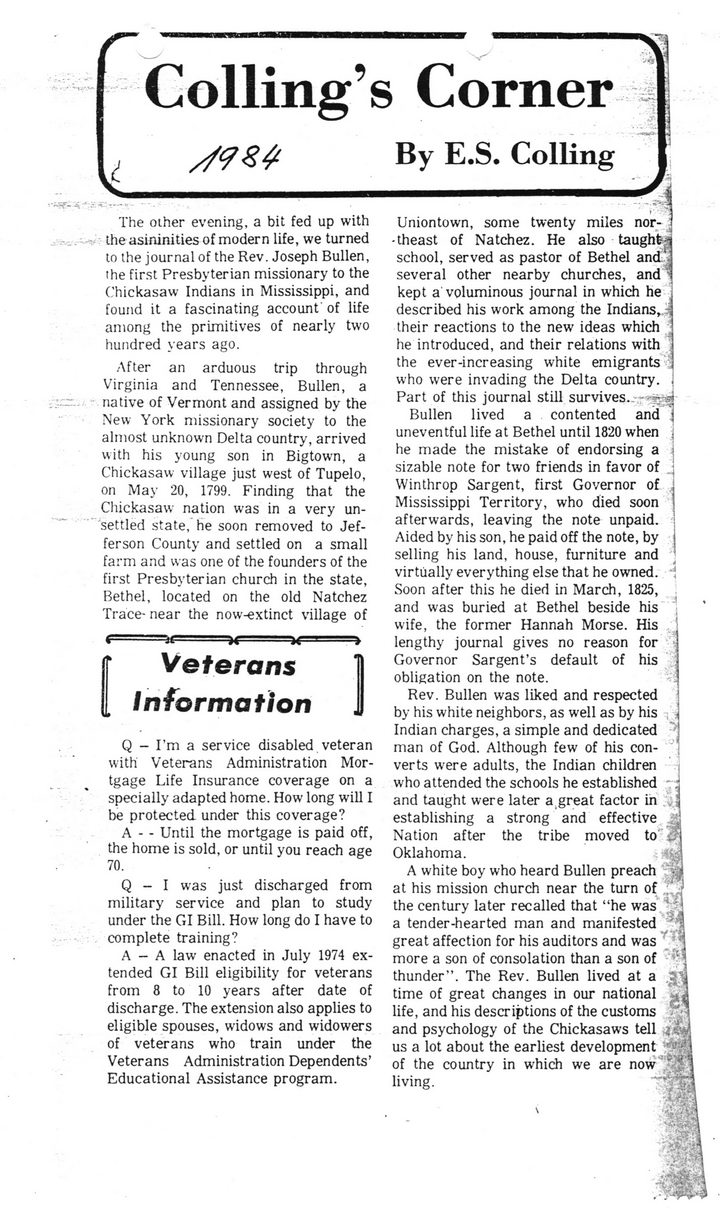This text was obtained via automated optical character recognition.
It has not been edited and may therefore contain several errors.
Colling?s Corner By E.S. Colling The other evening, a bit fed up with : the asininities of modern life, we turned to the journal of the Rev. Joseph Bullen, the first Presbyterian missionary to the Chickasaw Indians in Mississippi, and found it a fascinating account of life among the primitives of nearly two hundred years ago. After an arduous trip through Virginia and Tennessee, Bullen, a native of Vermont and assigned by the New York missionary society to the almost unknown Delta country, arrived with his young son in Bigtown, a Chickasaw village just west of Tupelo, on May 20, 1799. Finding that the Chickasaw nation was in a very unsettled state, he soon removed to Jefferson County and settled on a small farm and was one of the founders of the first Presbyterian church in the state, Bethel, located on the old Natchez Trace- near the now-extinct village of Veterans Information Q - I?m a service disabled veteran with Veterans Administration Mortgage Life Insurance coverage on a specially adapted home. How long will I be protected under this coverage? A - - Until the mortgage is paid off, the home is sold, or until you reach age 70. Q - I was just discharged from military service and plan to study under the GI Bill. How long do I have to complete training? A - A law enacted in July 1974 extended GI Bill eligibility for veterans from 8 to 10 years after date of discharge. The extension also applies to eligible spouses, widows and widowers of veterans who train under the Veterans Administration Dependents? Educational Assistance program. Uniontown, some twenty miles nor-.j -theast of Natchez. He also taughfej school, served as pastor of Bethel andL several other nearby churches, and kept a voluminous journal in which he described his work among the Indians,, their reactions to the new ideas which he introduced, and their relations with the ever-increasing white emigrants who were invading the Delta country. Part of this journal still survives..-.?*^ Bullen lived a contented and uneventful life at Bethel until 1820 when he made the mistake of endorsing a sizable note for two friends in favor of Winthrop Sargent, first Governor of Mississippi Territory, who died soon afterwards, leaving the note unpaid. Aided by his son, he paid off the note, by selling his land, house, furniture and virtually everything else that he owned. Soon after this he died in March, 1825, and was buried at Bethel beside his wife, the former Hannah Morse. His lengthy journal gives no reason for Governor Sargent?s default of his obligation on the note. Rev. Bullen was liked and respected by his white neighbors, as well as by his Indian charges, a simple and dedicated man of God. Although few of his converts were adults, the Indian children who attended the schools he established and taught were later a great factor in establishing a strong and effective Nation after the tribe moved to Oklahoma. A white boy who heard Bullen preach rj at his mission church near the turn of the century later recalled that ?he was a tender-hearted man and manifested * great affection for his auditors and was ' more a son of consolation than a son of thunder?. The Rev. Bullen lived at a time of great changes in our national life, and his descriptions of the customs and psychology of the Chickasaws tell j. us a lot about the earliest development of the country in which we are now** living.

First Presbyterian Church Colling's-Corner-(1984)